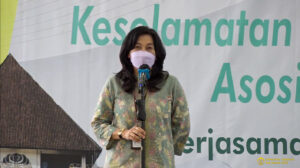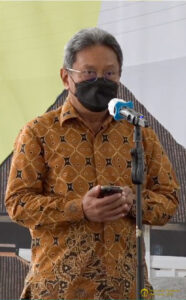
In an effort to build a practice of patient safety towards zero harm, Universitas Indonesia (UI) and Ministry of Health of Indonesia (Kemenkes RI) collaborated to organize an activity entitled “Patient Safety Campaigns and Advocacy at Health Service Facilities of Professional Organizations, Educational Associations, and Community” in the 2nd floor of Plaza Room, Felfest UI, on Wednesday (26/10).
UI Secretary dr. Agustin Kusumayati, M.Sc., Ph.D., in her opening speech said that the Covid-19 pandemic has made people aware of many things, one of which is the important role of public health in general. When humans are about to start economic activities or various other social activities, occupational safety and health are very much needed.
“When the Covid-19 pandemic was at its peak, it was impossible for health services to stop their services because they had to serve the community. That’s when the urgency emerged from the application of occupational safety and health in hospitals or Health Service Facilities (Fasyankes). The application of health, safety, and environment (HSE) not only seeks to ensure the safety of patients who become clients of the hospital, but also the most important thing is to provide safety protection to health workers who provide services,” said dr. Augustine.
This patient safety campaign and advocacy activity was carried out in parallel by three speakers: Head of the Referral Health Service Quality Team, Ministry of Health of Indonesia, dr. Irna Lidiawati, MARS.; Chairman of National Committee for Patient Safety, Ministry of Health of Indonesia, dr. Bambang Tutuko Sp.An KIC.; and Head of HSE Unit of Universitas Indonesia Hospital Meilisa Rahmadani, S.K.M., M.K.K.K.
In her presentation, Dr. Irna delivered material related to the quality policy of patient safety in hospitals. According to data from the World Health Organization (WHO) 2017, it states that 1 in 10 patients hospitalized are injured due to safety incidents or about 10% of patients treated. Patient safety incidents are any unintentional incidents and conditions that result or have the potential to result in preventable injury to patients (Regulation of Minister of Health of the Republic of Indonesia number 11 of 2017 concerning Patient Safety).

“We already have a special policy regarding patient safety, which is the Regulation of Minister of Health number 11 of 2017. This regulation states that patient safety is a system that makes patient care safer. Thus, we have to start thinking about what might happen. This includes risk assessment, patient risk identification and management, incident reporting and analysis,” said dr. Irna.
On the same occasion, Dr. Bambang said that one of the government’s efforts to improve patient safety in health care facilities is by establishing the National Patient Safety Committee (KNKP). KNKP is a functional organization under the coordination of Directorate General, and is responsible to the Minister. The KNKP membership consists of elements from Ministry of Health, related ministries/institutions, health service facility associations, and related professional organizations.

“To obtain a practice of patient safety, an organization needs to conduct a survey of patient safety culture regularly and continuously. In addition, it is necessary to make learning and improvement according to the survey results, to achieve maturity and competence in patient safety culture,” said dr. Bambang.

Meanwhile, Meilisa explained the implementation of the patient safety program at Universitas Indonesia Hospital (RSUI). There are two approaches used by RSUI, namely the Integrated Safety Culture In Hospital (ISCH) model and the Integrated Safety Culture Hospital Assessment (ISCHA) instrument. ISCH is an integrated quality and safety improvement program at RSUI. This program is an innovative RSUI program as an integrated system in safety culture. Meanwhile, ISCHA is an instrument model developed for measuring the level of integrated RSUI safety culture.
